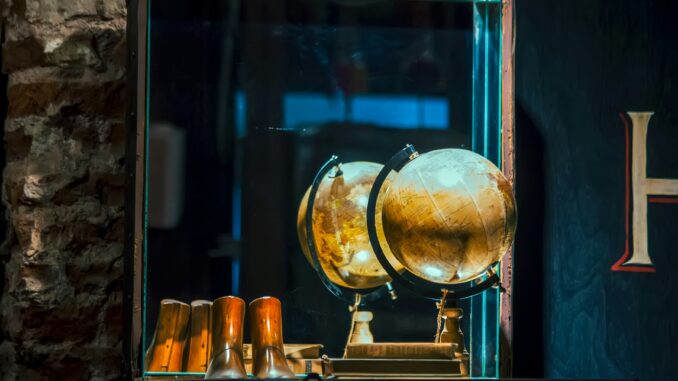
Over the next ten days we will be publishing the ten finalists from the 2024 Voorheesville Short Story Contest. The theme of this year’s contest was “But There’s a Catch.” This, the fifth of our ten finalist stories, made it to the final round of judging with our guest judge, Laurin Jefferson. Today, enjoy Hailey LeClair’s story, “The Mirror’s Tragedy”
In the quiet heart of the city, where narrow streets wound between aging buildings and the shadow of prosperity loomed over the worn cobblestones, there stood a forgotten bookstore. It nestled in a corner, its windows clouded with the dust of time and its shelves burdened with books that had not felt the touch of eager hands in many years. This was my refuge—a sanctuary of stories that offered solace from the harsh realities of my life.
I was sixteen then, a boy of modest means, living with my parents in a cramped apartment above a bakery. The son of hardworking parents who struggled to make ends meet, burdened by the weight of my family’s struggles. Poverty had etched lines of weariness upon their faces, and I, their only child, carried their unspoken sacrifices, and our humble existence offered little respite from the burdens of family life. My father toiled long hours kneading dough, while my mother cleaned houses. We were good people, honest and respectable, but luck had not favored us with wealth or fortune, and most recently, well-being.
It was on an unremarkable afternoon when I was avoiding my parents’ ailing bodies that I first stumbled upon the mirror. I had been idly browsing the bookstore’s shelves, my fingers tracing the spines of books older than my grandparents, when I noticed an oddity—a small alcove tucked away in a forgotten corner. There, amidst dusty volumes and forgotten relics, stood an ornate mirror unlike any I had ever seen. The mirror itself was flawless, its surface gleaming with an unsettling clarity that caught my reflection and held it captive. As I gazed into its depths, I felt a strange pull—an invitation to step closer, to peer beyond the glass and into another world.
Intrigued, I leaned in, my breath fogging the mirror’s surface. The world around me faded, replaced by a scene so vivid and unfamiliar that I could scarcely believe my eyes. Before me stretched a long hallway lined with portraits of noble ancestors, bathed in the soft glow of chandeliers. The air was redolent with the scent of polished wood and roses—a stark contrast to the bakery’s yeasty aroma that clung to my clothes.
I blinked, unsure if I had fallen asleep amidst the musty books, but the mirror’s enchantment persisted. Before long, figures appeared in the hallway—a woman with striking features, her eyes alight with warmth, and a man whose broad shoulders bore the confidence of someone accustomed to command. I was transported into a world full of opulence and grandeur—a world where my parents’ smiles were free of worry, where laughter rang through the halls adorned with gilded splendor. A lavish mansion stretched out, filled with glistening chandeliers and rich tapestries. Figures moved within, their laughter echoing through marble halls. Among them stood my parents, transformed into regal versions of themselves, smiling with a comfort I had rarely seen.
“Darling, you’re home,” my mother’s voice chimed, almost like an old bell that still sounded just as it did when it was first created.
I was dumbfounded, unable to tear my gaze from the mesmerizing tableau unfolding before me. The man approached, a reassuring smile on his lips.
“Welcome home, son,” he said, his voice resonant and kind.
Home. The word echoed in my mind, stirring emotions I had long since buried beneath the weight of our struggles. Could this be a dream, or had I stumbled upon something truly extraordinary?
“You must be mistaken,” I stammered, my heart pounding. “I… I don’t belong here.”
The woman’s laughter was a melody, her eyes crinkling at the corners with genuine amusement. “Oh, but you do. This is your birthright, your legacy.”
Legacy. The word hung in the air. I glanced back at the mirror, half-expecting to see my reflection replaced by that of a stranger, but there I stood—same unruly hair, same worn clothes, same uncertain expression.
The man—whom I somehow knew to be my father—gestured toward a grand staircase. “Come, let us show you around.”
The new world felt simultaneously foreign and achingly familiar, a contradiction that left me reeling. But curiosity won out over caution, and I followed them into the mansion that awaited beyond the mirror.
My “parents”—if indeed they were mine—introduced me to a life of privilege and luxury. We dined on delicacies I had only read about, attended concerts in grand halls, and strolled through manicured gardens where peacocks preened. It was a life far removed from the bakery and our dingy apartment, where every coin was counted and every indulgence sacrificed. Days turned into weeks as I savored the luxuries of this alternate reality.
But beneath the surface of this enchanting facade and utopian existence, shadows lurked—a growing sense of unease that I dared not acknowledge.
Then came the night that shattered my illusion, as I strolled through the mansion’s gardens, basking in the illusion of serenity—a messenger’s solemn voice, bearing the news of tragedy. My parents, my real parents, unseen and neglected, lay gravely ill, their silent suffering a testament to the price of my selfish pursuit of happiness.
I returned to our apartment, the mirror’s spell broken, and found them ashen-faced, shadows of their former selves. Guilt clawed at my heart, for I had abandoned them whilst chasing a hollow dream.
Days passed in a blur of anguish and regret. My father’s cough echoed through the silent rooms, a haunting reminder of my folly. My mother’s eyes, once bright with hope, now mirrored the despair that gripped us all.
I stood before the mirror, its surface mocking me with reflections of a life I had forsaken. Anger flared within me—anger at myself, at the cruel trickery of fate. How could I have been so blind, so selfish?
But the mirror held no answers, only the cold truth that I had traded my family’s well-being for an illusion of happiness.
In the end, there was no redemption, no second chance. My parents succumbed to their illnesses, leaving me alone with the weight of my choices. I returned to the bookstore, the mirror’s allure now a bitter memory. Its frame, once a gateway to possibility, now served as a stark reminder of loss.
As I stood amidst the shelves, surrounded by stories of heroism and heartbreak, I realized the ultimate tragedy—the realization that some mirrors reflect not our dreams, but our deepest fears and regrets.
And so, I left the mirror behind, its secrets buried within the dusty alcove. The echoes of my folly lingered, a cautionary tale etched into my soul—a reminder that illusions, while enticing, always come at a cost too steep to bear.
I vowed to carry the burden of my mistakes, penance for the happiness I had forsaken.
As I stand now, with shards of the once-mesmerizing mirror scattered at my feet, I feel a searing pain shoot through my body, as if a thousand needles pierce my skin. The mirror, now broken and fragmented like my dreams, exacts its final toll, draining the last vestiges of life from my frail form. As darkness encroaches and my vision blurs, I realize that in my desperate bid to escape, I had unwittingly sealed my fate—a tragic swan song echoing in the silence of the old bookstore.


